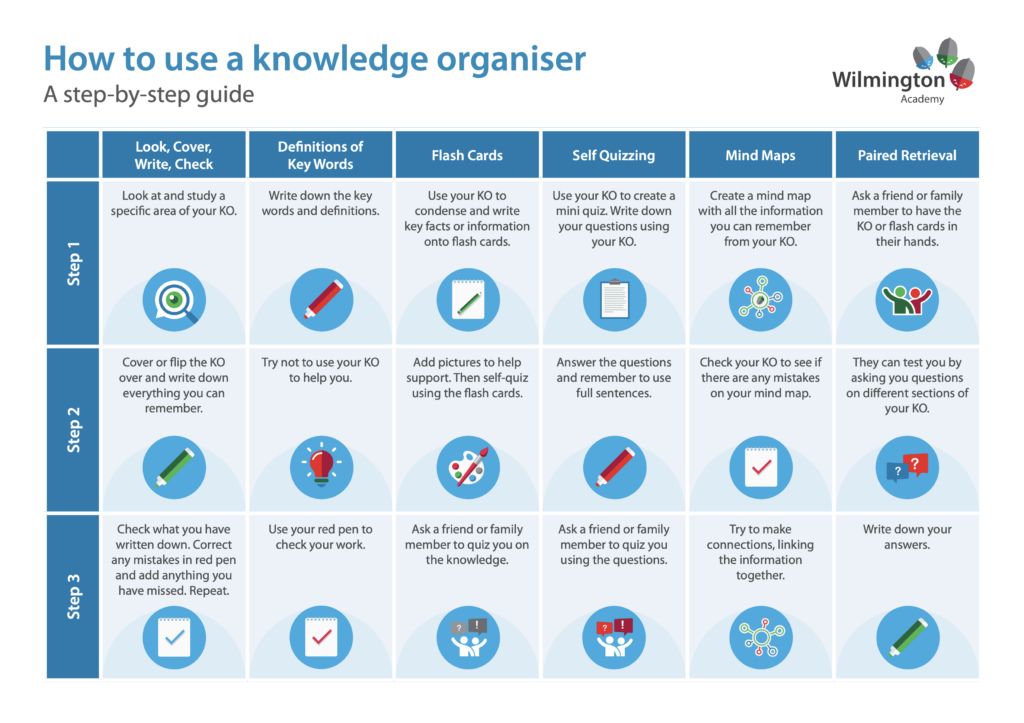What homework does my child receive?
There are 3 types of homework:
- Self-quizzing homework: Your child receives self-quizzing homework once a week from each subject. This ensures that your child is memorising and recalling the knowledge that they need to be successful.
- Paper homework: every week your child receives one piece of homework from each subject. In some subjects this homework is complete on paper e.g Art. It allows students to consolidate and extend their learning
- Online homework: some homework is set online and in place of paper homework. This includes most homework for Maths, Science, Humanities, MFL, Technology, Performing Arts, PE, Business and IT. Some subjects use specific online platforms e.g.
- Maths – https://sparxmaths.com/
- Science/Humanities – https://senecalearning.com/en-GB
- MFL – https://www.languagenut.com/en-gb/
Self-quizzing homework
For every learning cycle, the content for each subject is distilled into a knowledge organiser. Knowledge organisers will be used as a basis of low stakes testing across the module and this normally takes place as part of the starter activity in lessons. This will help build your child’s knowledge and confidence over the course of the module and the year, so that when they have an assessment, they can use the knowledge organisers for that subject as a revision tool. This encourages students to take ownership of their learning and to support them to develop good learning habits. Embedding this content is critical to long term success and effective retrieval from long term memory.
How to use a knowledge organiser, a step-by-step guide
Please click on the image below to open the guide in PDF form in a different tab.
Knowledge Organisers 2024-25
Knowledge Organisers FAQs
A knowledge organiser is a set of key facts or information that students need to know and be able to recall in order to master a unit or topic.
GCSEs and vocational courses are becoming increasingly challenging. The focus of these exams is the retrieval and application of knowledge. This puts increasing pressure on students to know and retain even more information for longer. The secret to success is to regularly revisit the knowledge to be learned. This helps transfer the knowledge from the short-term memory to the long-term memory. Using knowledge organisers helps best prepare your child for the level of recall needed to successfully complete the rigorous new-style 9-1 GCSE examinations.
Knowledge organisers will be made available at the start of each term to help students see the bigger learning journey in their subjects and help students remember what they are learning. Students will continually revisit and retrieve prior learning from their memories.
Many of you ask us how you can support your child at home. Some of you worry that you don’t have subject specific knowledge to help your child. The knowledge organisers support this. You could quiz your child on the information, help them create flash cards, mind maps, posters etc.
Students can use their Knowledge Organisers in a number of different ways but should not just copy from the Knowledge Organiser into their books.
They could:
- Create flash cards
- Create mind maps
- Create mnemonics
- Write their own challenging questions and then attempt to answer then the next day, next week etc
- Ask someone to write questions for them to answer
- Read, cover, write and check
- Put keywords into new sentences
- Test themselves on the definitions of keywords
- Give themselves spelling tests
- Draw diagrams of processes/equipment etc
- Draw images and annotate/label them with extra information
- Draw comic strips for timelines
- Create fact files
- Further research the topic
If you have any queries concerning the content of any knowledge organiser, please contact your child’s class teacher in the first instance. Thank you for your support in implementing this key strategy to help best prepare your child to become more confident, independent and prepared for learning.



